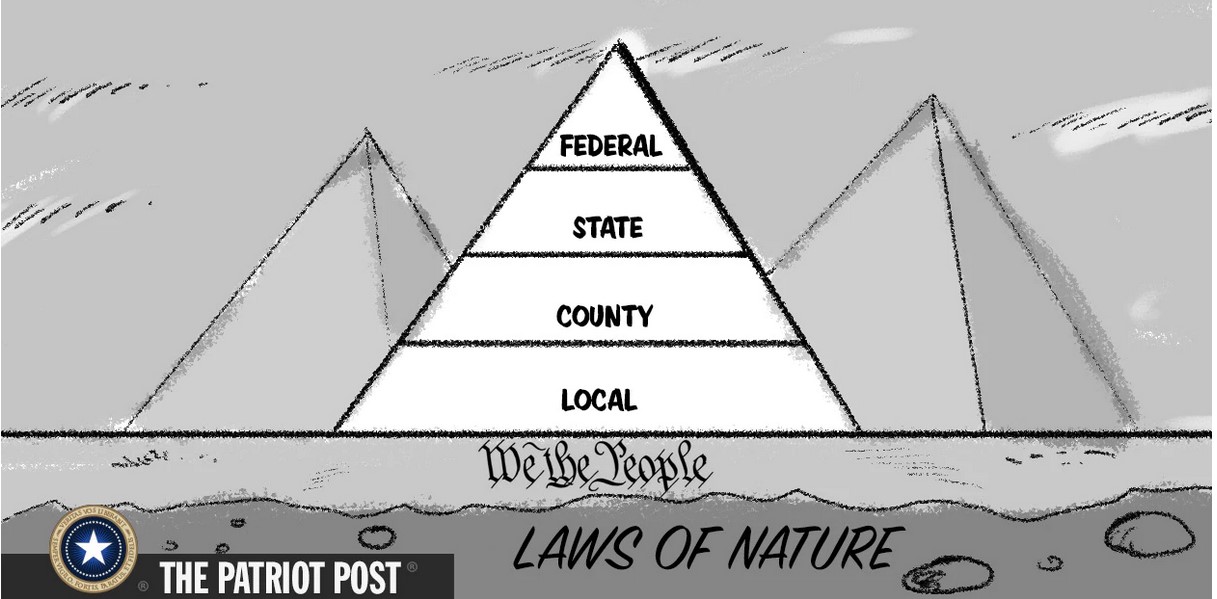 America's Republic Foundation
America's Republic Foundation
Established upon The Ultimate Law of God's Design: "The Laws of Nature and of Nature's God"
 America's Republic Foundation
America's Republic Foundation
Established upon
The Ultimate Law of God's Design:
"The Laws of Nature and of Nature's God"
Contents:
![]() "The Laws of Nature and of Nature's God"
"The Laws of Nature and of Nature's God"
![]() Biblical Influence in
America's Founding Fathers
Biblical Influence in
America's Founding Fathers
![]() Proclaiming the
Declaration of Independence
Proclaiming the
Declaration of Independence
"They define a republic to be a government of laws, and not of
men." --John Adams (1775)
See also: A Constitutional
Republic, not a pure Democracy "A Republic, if you can keep it"
"The Laws of Nature and of Nature's God."
"A
free people [claim] their rights as derived from the laws of nature, and not as
the gift of their chief magistrate." --Thomas Jefferson (1774)
"The laws of nature are the laws of God, who's authority
can be superseded by no power on earth." --George
Mason September 25, 1789, (1725-1792), "The Father of the Bill of Rights," author of the Virginia Constitution and the Virginia
Bill of Rights. This phrase of Mason's was mirrored in the
Declaration of Independence as "the laws of nature and nature's God."
Natural Law: The Ultimate Source of Constitutional Law -
Natural law is the
basis for Jefferson's assertions in the Declaration of Independence.
- "Man ... must necessarily be subject to the laws of his Creator.. This will of
his Maker is called the law of nature.... This law of nature...is of course
superior to any other.... No human laws are of any validity, if contrary to
this: and such of them as are valid derive all their force...from this
original." - Sir William Blackstone (Eminent English Jurist)
The Founders DID NOT establish the Constitution
for the purpose of granting rights. Rather, they established this government of
laws (not a government of men) in order to secure each person's Creator endowed
rights to life, liberty, and property. Only in America, did a nation's founders
recognize that rights, though endowed by the Creator as unalienable
prerogatives, would not be sustained in society unless they were protected under
a code of law which was itself in harmony with a higher law. They called it
"natural law," or "Nature's law." Such law is the ultimate source and
established limit for all of man's laws and is intended to protect each of these
natural rights for all of mankind. The Declaration of Independence of 1776
established the premise that in America a people might assume the station "to
which the laws of Nature and Nature's God entitle them.."
"Among the objects of the Constitution of this Commonwealth, Liberty &
Equality stand in a conspicuous light. It is the first article in our declaration
of rights, all men are born free & equal, & have certain natural, essential &
unalienable rights. In the supposed state of nature, all men are equally bound
by the laws of nature, or to speak more properly, the laws of the Creator: They
are imprinted by the finger of God on the heart of man." Samuel Adams
(1722-1803) Father of the American Revolution, Patriot and Statesman![]() Home
Home
![]() About
About
![]() Contact
Contact
![]() Search
Search
![]() News,
Commentary, & Action
News,
Commentary, & Action ![]() Recommended Books
Recommended Books
Declaration of Independence Opening Paragraphs:
"The law of nature, being coeval with mankind and dictated by God Himself,
is of course superior in obligation to any other. It is binding over all the
globe, in all countries, and at all times: no human laws are of any validity, if
contrary to this; and such of them as are valid derive all their force, and all
their authority, mediately or immediately, from the original." --William
Blackstone's 1753 treatise "Commentaries on the Laws of England:"
"Every human law has just so much of the nature of law as
is derived from the law of nature. But if at any point it deflects from the law
of nature, it is no longer a law but a perversion of the law." --Thomas
Aquinas.
"There is God's Law from which all equitable laws of man
emerge and by which men must live if they are not to die in oppression, chaos
and despair." --Cicero
Understanding this Foundation of applying God's Laws of
Nature provides insight to the deviant "moral compass" of
Democrat-Socialists in undermining the premise for determining how "Rights"
are to be "entitled." In their illogical foolishness, they ignore the science of
biology, a law of nature to satisfy their sinful pleasures that "go
against nature."
"The Laws of Nature and of Nature's God" provide an
innate direction in adhering to and abiding by God's design to live healthy,
morally and socially in order to prevent the inevitable consequences as a result
of inexcusably disobeying and acting outside the boundaries of God's design of
natural law.
"The struggle is...as I attempted to say in my inaugural, that the blessings which come to us come not from the generosity of the state by from the hand of God." ---JFK
Martin Luther King Jr. - Excerpts from his Letter from the Birmingham Jail April 16, 1963: "How does one determine whether a law is just or unjust? A just law is a man-made code that squares with the moral law or the law of God. An unjust law is a code that is out of harmony with the moral law. To put it in the terms of St. Thomas Aquinas: An unjust law is a human law that is not rooted in eternal law and natural law."
Dr. Martin Luther King Jr. also understood the colorblind nature of America's founding documents and in this same speech he challenged America, not to dispense with her founding documents, but to live up to them. He said, "When the architects of our republic wrote the magnificent words of the Constitution and the Declaration of Independence, they were signing a promissory note to which every American was to fall heir. This note was a promise that all men, yes, black men as well as white men, would be guaranteed the 'unalienable Rights' of "Life, Liberty and the pursuit of Happiness." (Hyatt, Abolitionist Founding Fathers, 54).
"[A]ll are subject by nature to equal laws of morality, and in society have a right to equal laws for their government, yet no two men are perfectly equal in person, property, understanding, activity, and virtue, or ever can be made so by any power less than that which created them, all are subject by nature to equal laws of morality, and in society have a right to equal laws for their government." --John Adams, Discourse on Davila
"The Laws of Nature and of Nature's God" vs. the love of counterfeits of the "god of this age." (2 Corinthians 4:4)
Standing on Natural Law is ‘Sinking Sand’ - By Gary DeMar - ...The framers believed that “the laws of nature and of nature’s God,” a phrase found in the Declaration of Independence, were almost universally accepted. This is why Clarence Thomas could write: “We look at the Natural Law beliefs of the founders as a background to our Constitution.”[2] When the left-leaning members of the committee heard this, they went on the attack. Thomas was saying that there are fixed moral laws written into the created order that even the Constitution and its interpreters are bound to follow.
During the Thomas hearings when he was being considered as a Supreme Court Justice, Biden wrote an article that appeared in the Washington Post. He claimed the following for his version of natural law:
• It does not “function as being a specific moral code regulating individual behavior.”
• It is not “a static set of unchanging principles.”
• It is “an evolving body of ideals.”
And that’s the problem with Natural Law. Who gets to define what’s natural? According to Biden, natural law is whatever the courts say it is or isn’t. A Supreme Court Justice doesn’t have to believe in fixed moral principles unless, of course, it means giving women the legal right to kill unborn babies or to redefine “gender.” If there were ever fixed natural laws, the right to abortion and gender fluidity would be first in line. Of course, abortion, homosexuality, and transgenderism are against even Darwinism.
Biblical Influence in America's Founding Fathers
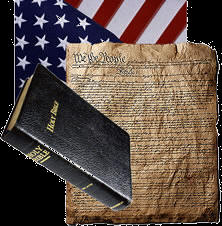
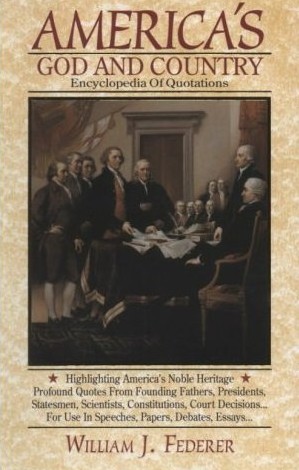 "After
reviewing an estimated 15,000 items, including newspaper articles, pamphlets,
books, monographs, etc., written between 1760-1805 by the 55 men who wrote the
constitution, Professors Donald S. Lutz and Charles S. Hyneman, in their work
'The Relative Influence of European Writers on Late Eighteenth-Century American
Political Thought' revealed that the Bible, especially the book of Deuteronomy,
contributed 34% of all quotations used by our Founding Fathers."2 "Additional
sources the founders quoted took 60% of their quotes from the Bible. Direct and
indirect citations combined reveal that the majority of all quotations
referenced by the Founding Fathers are derived from the Bible."3
"After
reviewing an estimated 15,000 items, including newspaper articles, pamphlets,
books, monographs, etc., written between 1760-1805 by the 55 men who wrote the
constitution, Professors Donald S. Lutz and Charles S. Hyneman, in their work
'The Relative Influence of European Writers on Late Eighteenth-Century American
Political Thought' revealed that the Bible, especially the book of Deuteronomy,
contributed 34% of all quotations used by our Founding Fathers."2 "Additional
sources the founders quoted took 60% of their quotes from the Bible. Direct and
indirect citations combined reveal that the majority of all quotations
referenced by the Founding Fathers are derived from the Bible."3
1. Florida v. City of Tampa, 48
So. 2d 78 (Fla. 1950); see also Commissioners of Johnson County v. Lacy, 93 S.E.
482, 487 (N.C. 1917) ("Our laws are founded upon the Decalogue).
2. William J. Federer, The Ten Commandments & their Influence on American Law (Amerisearch
Inc. St. Louis, MO. 2003) p.19.
3. Ibid; p.19. Federer's sources are as follows: Donald S. Lutz and Charles S.
Hyneman, "The Relative Influence of European Writers on Late Eighteenth-Century
American Political Thought." American Political Science Review 189 (1984):
189-197. (Courtesy of Dr. Wayne House of Dallas Theological Seminary.) John
Eidsmoe, Christianity and the Constitution -The Faith of Our Founding Fathers
(Grand Rapids, MI: Baker Book House, A Mott Meida Book, 1987; 6th printing,
1993), pp. 51-53. Origions of American Constitutionalism, (1987). Stephen K.
McDowell and Mark A. Beliles, America's Providential History (Charlottesville,
VA: Providence Press, 1988), p. 156.
Blackstone's Commentaries of Laws of England, Charles Finney's
Gospel Revival, & "another gospel"--Liberation Theology Social
Justice - ...Sir William Blackstone's Commentaries on the
Laws of England had a great influence on America's founders.
...Blackstone drew upon a long tradition of earlier documents
highlighting Creator-given rights, which eventually crystallized
into America's Declaration of Independence.
...GOVERNMENT has the shortest command, namely, protect the
innocent and punish the guilty. There is no Biblical command for
government to help the poor, take care of the sick, dispense
healthcare, operate schools, provide jobs, or other
entitlements. Many churches have neglected responsibilities only
to have government usurp them. Just because something needs to
be done does not mean it is the governments job to do it.
...[Primary author of the U.S. Constitution] James Madison
explained to Congress, 1794: "The government of the United
States is a definite government, confined to specified objects
...Charity is no part of the legislative duty of the government."
...Davy Crockett served 3 terms in the U.S. Congress between 1827 and
1835, before dying at the Texas Alamo. When Congress was
debating whether to use taxes collected from citizens to
redistribute to someone in need, Davy Crockett gave a speech
"Not Yours to Give": "Congress has not the power to appropriate
this money as an act of charity. Every member on this floor
knows it. We have the right as individuals, to give away as much
of our own money as we please in charity; but as members of
Congress we have no right to appropriate a dollar of the public
money, as charity ... The power of collecting and disbursing
money at pleasure is the most dangerous power that can be
entrusted to man ... Mr. Speaker, I have said we have the right
to give as much money of our own as we please. I am the poorest
man on this floor. I cannot vote for this bill, but I will give
one week's pay to the object, and if every member of Congress
will do the same, it will amount to more than the bill asks."
...President Grover Cleveland opposed Federal welfare, vetoing of the
Texas Seed Bill in 1887: "Federal aid in such cases encourages
the expectation of paternal care on the part of the government
and weakens the sturdiness of our national character."
...Charles Finney warned:
"If immorality prevails in the land, the fault is ours in a
great degree.
If there is a decay of conscience, the pulpit is responsible for
it.
If the public press lacks moral discrimination, the pulpit is
responsible for it.
If the church is degenerate and worldly, the pulpit is
responsible for it.
If the world loses its interest in religion, the pulpit is
responsible for it.
If Satan rules in our halls of legislation, the pulpit is
responsible for it.
... If our politics become so corrupt that the very foundations
of our government are ready to fall away, the pulpit is
responsible for it. Let us not ignore this fact, my dear
brethren; but let us lay it to heart, and be thoroughly awake to
our responsibility in respect to the morals of this nation."
...Charles Finney: "Do not suppose, now, that I am going to preach
a political sermon, or that I wish to have you join and get up a
Christian party in politics. No, I do not believe in that. But
the time has come that Christians must vote for honest men, and
take consistent ground in politics, or the Lord will curse them
..."
President John Adams - "From the day of the Declaration . . .they [the American people] were bound by the laws of God, which they all, and by the laws of the Gospel, which they nearly all, acknowledge as the rules of their conduct." And, "From the day of the Declaration . . .they [the American people] were bound by the laws of God, which they all, and by the laws of the Gospel, which they nearly all, acknowledge as the rules of their conduct." - President John Adams ...And, "[This] Form of Government is productive of every Thing which is great and excellent among Men. But its Principles are as easily destroyed, as human nature is corrupted. A Government is only to be supported by pure Religion or Austere Morals. Private and public Virtue is the only Foundation of Republics." -- John Adams, 2nd president of the United States of America (Warren-Adams Letters, Massachusetts Historical Society, 1917, Vol. 1, p. 222)
Did America s Founding Fathers believe in God?PragerU) Were they Christians? Or were they just Deists? And why is it important? In this video, Joshua Charles, author and researcher at the Museum of the Bible, explains that, while men like Washington, Adams, Jefferson and Franklin each took different approaches to religion, all of them were steeped in the traditional Judeo-Christian values found in the Bible. But did their beliefs influence how they thought America should be governed? Watch the video at the link to find out.
Thomas Jefferson, letter to Henry Lee, 1825 - "This was the object of the Declaration of Independence. Not to find out new principles, or new arguments, never before thought of, not merely to say things which had never been said before; but to place before mankind the common sense of the subject, in terms so plain and firm as to command their assent, and to justify ourselves in the independent stand we are compelled to take. Neither aiming at originality of principle or sentiment, nor yet copied from any particular and previous writing, it was intended to be an expression of the American mind, and to give to that expression the proper tone and spirit called for by the occasion."
The Birth of the U. S. Constitution - In this excerpt of Providence Forum's newest documentary, "We the People," you'll discover some of the Christian leaders who gave us the U.S. Constitution and a system of government that has been the envy of freedom-loving people everywhere. Providence Forum is an outreach of D. James Kennedy Ministries.
List of
Resources:
o
The history of the drafting of the Declaration of Independence.
o
Creating the Declaration of Independence - A Time Line
o
Religious Affiliation of the Founding Fathers of the United
States of America
o
Did You Know? Learn what you have not been taught and/or
mislead about America's Heritage
o The
Bible and Government Biblical Principles: Basis for America's
Laws
o
Heritage's Guide to the Constitution - This interactive website offers a
clause-by-clause analysis of the entire Constitution and each amendment. These
expert insights allow you to confidently defend the principles of freedom that
we all hold dear.
o The
Three Branches of the United States Government
o
What Is The Electoral College? Bald Beagle video, our educational channel for kids. Jordan Sekulow ACLJ Executive Director: A This week Bald Beagle released our newest video (and yes, it will get stuck in your head): "What Is the Electoral College?" This fun kids' video is meant to simplify this Electoral College thing they'll be hearing about over the next week. As we've seen in the media, even adults could use this refresher on how our Constitution sets up electing the President. Within hours, extreme Leftists and atheists began attacking the video and the ACLJ for "brainwashing" kids with conservative propaganda. Bald Beagle is our brand-new channel creating engaging, educational content that illustrates the great, and sometimes complicated, history of our country. Our videos help explain how the government works, and highlight the moral principles it was founded on. Not surprisingly, the Left hates that. They want America's history erased and rewritten. In their twisted new American story, conservatives and people of faith will be the villains. Talk about brainwashing. We cannot allow America to become a dystopian socialist nightmare. Children are the future of our nation. They need to know the truth. Watch the video with your kids and grandkids.o
Electoral College vs. National Popular Vote (NPV) Mob Ruleo
Public Administration Explained: Branches of the US Government - The United States Constitution established the nation's current system of government when it was signed in 1787. The government consists of three branches, and the power of the government is divided between them in a system of checks and balances so that no one branch is too powerful. The executive, legislative, and judicial branches work together to keep our government running smoothly and efficiently.o
The Three Branches of the United States Government - By Brian Joslyn - This article discusses the three branches of government in a really simplistic way. Easy for middle school and high school students to understand. o The Myth of Three Co-Equal Branches of Government [VIDEO] James Madison, known as the father of the Constitution, stated in Federalist Paper 51:L "In republican government, the legislative authority necessarily predominates. The remedy for this inconveniency is to divide the legislature into different branches." ...Congress' authority predominates, which is why we have divided the power into two branches. ...If we place the number of authorities of each Branch found in the Constitution, we see the scale disproportionate with the Legislative Branch having roughly forty-eight powers, followed by the Executive Branch with roughly twelve powers, and in last place the Judicial Branch with roughly three powers. ...To add further credibility to the discriminate powers of Congress, we find they have power to impeach ANY member of the other two branches!o
What is the Federal Reserve? (Video 0:2:19)o
A Kid's Guide to Constitutional Law If you asked someone what the three most important documents are in U.S. history, one of them would surely be the Constitution. This document outlines how our government works, what legal rights we have, how the government works, and even the way that we can change the Constitution as our country changes. Today, a lots our laws are tied to the Constitution and how we interpret it. Games and Lessons: Rebuild the Bill of Rights, Branch-O-Mania, Lesson: Constitution for Kids, Do I Have a Right?, Power Play, That's Your Right, Who Is Your Founding Father?, Bill of Rights Match Game, Constitution Quiz, The Creation of the Bill of Rights, Name That Founding Father, Checks and Balances, Life Without the Bill of Rights, Talking About My Constitution, Court Questo
Teaching Your Kids The Bill of Rights | A Parents Guide - Why Is It Important for Kids to Learn About the Bill of Rights? - The Bill of Rights Simplified for Your Kids Learning about the Bill of Rights is essential for kids because it helps them understand their freedoms as Americans.
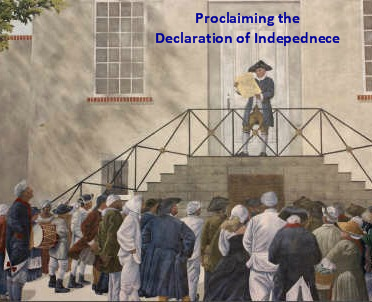 Proclaiming
the Declaration of Independence
Proclaiming
the Declaration of Independence
On August 1, 1776, Samuel Adams stood before a large crowd on the steps of
the Philadelphia Statehouse and delivered a speech before the formal signing of the
Declaration Of Independence on August 2, 1776
The Constitution is an expression of the Declaration of Independence.
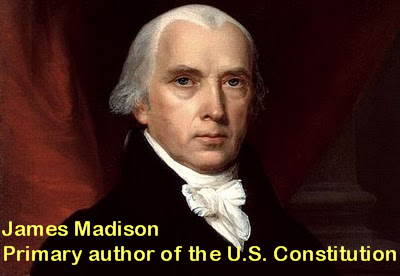 The
Constitution's primary author, James Madison, wrote Thomas Jefferson on 8
February 1825, these words concerning the supremacy of the Declaration of
Independence over our nation's Constitution: "On the distinctive
principles of the Government...of the U. States, the best guides are to be found
in...The Declaration of Independence, as the fundamental Act of Union of these
States.
The
Constitution's primary author, James Madison, wrote Thomas Jefferson on 8
February 1825, these words concerning the supremacy of the Declaration of
Independence over our nation's Constitution: "On the distinctive
principles of the Government...of the U. States, the best guides are to be found
in...The Declaration of Independence, as the fundamental Act of Union of these
States.
James Madison also declared:
o "The belief in a God All Powerful wise and good, is so essential to the moral order of the world and to the happiness of man, that arguments which enforce it cannot be drawn from too many sources nor adapted with too much solicitude to the different characters and capacities impressed with it." (In a letter to Frederick Beasley.)
o "The equal right of every citizen to the free exercise of his Religion according to the dictates of conscience" is held by the same tenure with all our other rights." ( "Memorial and Remonstrance against Religious Assessments" )
The Most Important Founding Father You May Not Remember - By Rep. Mark Green ...It's because of James Madison's foresight that our nation has been able to guard against centralized power for over 200 years. And today, as we face an ever-growing federal government seeking to control the lives of Americans from cradle to grave, the best thing we can do for our nation is go back to Madison's original system of constitutional government. To figure out what that means, we can read what Madison wrote himself. He laid out a new "science of politics" in both the ninth (t.ly/6hCz) and 10th (t.ly/34XA) Federalist Papers. Here we learn that we have his idea of an extended republic to thank for convincing skeptical Americans that republican government is possible.
Most Americans in the 18th century looked down on republics as a failed form of government. Madison and the rest of the Founders sought to prove them wrong, and it worked! Madison discovered the solution to the ancient problem of tyranny of the majority. He devised a system whereby the diverse interests of our growing country would compete with each other, preventing a single group from dominating the others. This is why our nation has been able to rise above even our own failures. Madison believed in our ability to improve upon the past. He managed to devise a constitutional system that would continually improve upon itself as time moved forward.
...Unfortunately, today, that freedom is under attack. Radical leftist ideologies seek to tear down the institutions and systems put in place by the Founding generation and replace them with a dystopian nightmare. We have based our current success on the superior efforts of our ancestors. We must not sacrifice this success on the altar of failed political ideologies like communism and socialism. Over the course of our history, the executive branch has usurped more and more power. Since the onset of the 20th century, presidents have increased their use of executive orders to bypass Congress. But the threat to our constitutional system goes beyond political agendas.
Calvin Coolidge, July 5, 1926, Philadelphia, PA - "No other theory is adequate to explain or comprehend the Declaration of Independence. It is the product of the spiritual insight of the people. We live in an age of science and of abounding accumulation of material things. These did not create our Declaration. Our Declaration created them. The things of the spirit come first. Unless we cling to that, all our material prosperity, overwhelming though it may appear, will turn to a barren scepter in our grasp. If we are to maintain the great heritage which has been bequeathed to us, we must be like-minded as the fathers who created it. We must not sink into a pagan materialism. We must cultivate the reverence which they had for the things that are holy. We must follow the spiritual and moral leadership which they showed. We must keep replenished, that they may glow with a more compelling flame, the altar fires before which they worshiped."
On July 3, 1776, Founding Patriot John Adams wrote to his beloved wife, Abigail: Yesterday, the greatest question was decided, which ever was debated in America, and a greater, perhaps, never was or will be decided among men. You will see in a few days a Declaration setting forth the causes which have impelled us to this mighty revolution, and the reasons which will justify it in the sight of God and man. ... It ought to be commemorated as the Day of Deliverance by solemn Acts of Devotion to God Almighty. It ought to be solemnized with pomp and parade, with shews, games, sports, guns, bells, bonfires and illuminations from one end of this Continent to the other from this time forward forever more. You will think me transported with Enthusiasm but I am not. I am well aware of the Toil and Blood and Treasure, that it will cost us to maintain this Declaration, and support and defend these States. Yet through all the Gloom I can see the Rays of ravishing Light and Glory. I can see that the End is more than worth all the Means. And that Posterity will triumph in that Day's Transaction.
"We have staked the whole future of American civilization, not upon the power of government, far from it. We have staked the future of all of our political institutions upon the capacity of mankind of self-government; upon the capacity of each and all of us to govern ourselves, to control ourselves, to sustain ourselves according to the Ten Commandments of God." James Madison (1751-1836) Father of the Constitution, 4th President of the United States
"Only a virtuous people are capable of freedom. As nations become corrupt and vicious, they have more need of masters." ... "The worship of God is a duty...Freedom is not a gift bestowed upon us by other men, but a right that belongs to us by the laws of God and nature, I never doubted the existence of the Deity, that he made the world, and governed it by His Providence...The pleasures of this world are rather from God's goodness than our own merit... Whoever shall introduce into the public affairs the principles of primitive (essential) Christianity will change the face of the world... Rebellion to tyrants is obedience to God." --Benjamin Franklin
"I never had a feeling politically that did not spring from the sentiments embodied in the Declaration of Independence." --Abraham Lincoln Address at Independence Hall Philadelphia, Pennsylvania February 22, 1861
When the Declaration of Independence was approved JULY 4, 1776 John Hancock signed first, saying "the price on my head has just doubled." Benjamin Franklin said "We must hang together or most assuredly we shall hang separately." Of the 56 signers: 17 lost their fortunes, 12 had their homes destroyed, 5 became prisoners of war, 1 had two sons imprisoned on the British starving ship Jersey, 1 had a son killed in battle, 1 had his wife die from harsh prison treatment and 9 signers died during the War. When Samuel Adams signed the Declaration, he said: "We have this day restored the Sovereign to whom all men ought to be obedient. He reigns in heaven and from the rising to the setting of the sun, let His kingdom come." John Adams said: "I am apt to believe that it will be celebrated by succeeding generations as the great anniversary Festival. It ought to be commemorated, as the Day of Deliverance, by solemn acts of devotion to God Almighty." John Adams continued: "I am well aware of the toil and blood and treasure that it will cost to maintain this Declaration...Yet through all the gloom I can see the rays of ravishing light and glory...Posterity will triumph in that day's transaction, even though we [may regret] it, which I trust in God we shall not."
Rev. John Witherspoon: He lost two sons in the Revolution, was the only clergyman to sign the Declaration and served on 120 Congressional Committees. His name was John Witherspoon, and he died NOVEMBER 15, 1794. Born in Scotland, he was a descendant of John Knox. John Witherspoon was President of Princeton, leader of a New Jersey committee to abolish slavery, and taught 9 of the writers of the U.S. Constitution, including James Madison. His other Princeton students include a U.S. Vice-President, Supreme Court Justices, Cabinet Members, Governors, Senators and Congressmen. John Adams described John Witherspoon as "A true son of liberty...but first, he was a son of the Cross." On May 17, 1776, the day Congress declared a Day of Fasting, Rev. John Witherspoon told his Princeton students: "He is the best friend to American liberty, who is most...active in promoting true and undefiled religion...to bear down profanity and immorality of every kind. Whoever is an avowed enemy of God, I scruple not to call him an enemy of his country. It is in the man of piety and inward principle that we may...find the uncorrupted patriot, the useful citizen, and the invincible soldier." John Witherspoon concluded: "God grant that in America true religion and civil liberty may be inseparable."
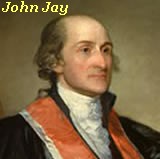 October 12, 1816 John Jay, America's 1st
Supreme Court Justice set forth in clear and concise terms his belief that
America's leaders must be first and foremost, Christian: "Providence has given
to our people the choice of their rulers, and it is the duty, as well as the
privilege and interest of our Christian nation to select and prefer Christians
for their rulers."
October 12, 1816 John Jay, America's 1st
Supreme Court Justice set forth in clear and concise terms his belief that
America's leaders must be first and foremost, Christian: "Providence has given
to our people the choice of their rulers, and it is the duty, as well as the
privilege and interest of our Christian nation to select and prefer Christians
for their rulers."
The American Bible Society was started by an act of Congress and John Adams, our second president, served as its first leader.
Twelve of the original 13 colonies incorporated the entire Ten Commandments into their civil and criminal codes.
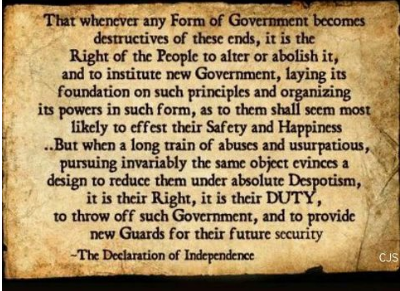
Understanding the Difference Between Freedom and Liberty
- By Robert Hathorne - ...What was Jefferson stating when he applied the words despotism, oppression, tyranny, and tyrant? Jefferson was clearly stating this new United States of America would have "freedom from" despotism, oppression, tyranny, and a tyrant, and that we as a nation would fight to have that "freedom from." And fight they did. As a result, in our new United States of America, the people would be "free from" and would now have the liberty to be "free to" make free choices for themselves, their family, their community, their church, etc. Simply stated, freedom means to be "free from," and liberty means to be "free to." Again, both terms mean the quality to be "free." And with liberty comes accountability and responsibility for the personal decisions one makes with that liberty."The day of our nation's birth in that little hall in Philadelphia, [was] a day on which debate had raged for hours. The men gathered there were honorable men hard-pressed by a king who had flouted the very laws they were willing to obey. Even so, to sign the Declaration of Independence was such an irretrievable act that the walls resounded with the words 'treason, the gallows, the headsman's axe,' and the issue remained in doubt. [On that day] 56 men, a little band so unique we have never seen their like since, had pledged their lives, their fortunes and their sacred honor. Some gave their lives in the war that followed, most gave their fortunes, and all preserved their sacred honor... In recent years, however, I've come to think of that day as more than just the birthday of a nation. It also commemorates the only true philosophical revolution in all history. Oh, there have been revolutions before and since ours. But those revolutions simply exchanged one set of rules for another. Ours was a revolution that changed the very concept of government. Let the Fourth of July always be a reminder that here in this land, for the first time, it was decided that man is born with certain God-given rights; that government is only a convenience created and managed by the people, with no powers of its own except those voluntarily granted to it by the people. We sometimes forget that great truth, and we never should." --Ronald Reagan
"May it be to the world, what I believe it will be, (to some parts sooner, to others later, but finally to all,) the signal of arousing men to burst the chains under which monkish ignorance and superstition had persuaded them to bind themselves, and to assume the blessings and security of self-government. That form which we have substituted, restores the free right to the unbounded exercise of reason and freedom of opinion. All eyes are opened, or opening, to the rights of man. The general spread of the light of science has already laid open to every view the palpable truth, that the mass of mankind has not been born with saddles on their backs, nor a favored few booted and spurred, ready to ride them legitimately, by the grace of God. These are grounds of hope for others. For ourselves, let the annual return of this day forever refresh our recollections of these rights, and an undiminished devotion to them." --Thomas Jefferson
Bill of Rights: "Congress shall make no law respecting the establishment of religion, or prohibiting the free exercise thereof." Thus began the first of the Ten Amendments, or Bill of Rights, which were approved SEPTEMBER 25, 1789. George Mason, known as "The Father of the Bill of Rights," wrote the Virginia Declaration of Rights from which Jefferson drew to write the Declaration of Independence. George Mason was one of 55 founders who wrote the U.S. Constitution, but was also one of sixteen who refused to sign it because it did not abolish slavery and did not limit the power of the Federal Government. George Mason joined with Patrick Henry and Samuel Adams to prevent the Constitution from being ratified, as the abuses of King George III's concentrated power were still fresh. It was largely through George Mason's insistence that in the first session of Congress ten limitations or amendments were put on the new Federal Government. George Mason suggested the wording of the First Amendment be: "All men have an equal, natural and unalienable right to the free exercise of religion, according to the dictates of conscience; and that no particular sect or society of Christians ought to be favored or established by law in preference to others."